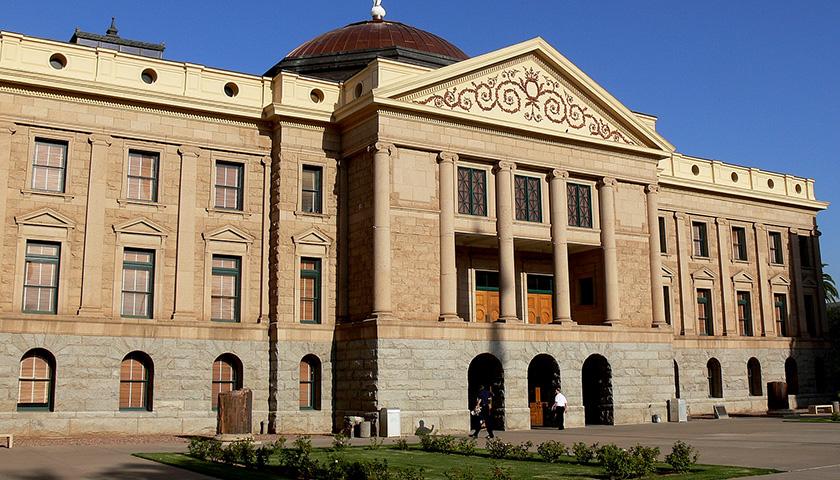The Arizona civic organization Davos in the Desert hosted a “Get Trump” virtual conference on lawfare Tuesday featuring various experts. Some speakers, such as Arizona attorney Mark Sonnenklar and Louisiana attorney Daniel R. Street, focused heavily on election fraud and other illegalities in the 2020 election.
Sonnenklar, who worked as a roving attorney during the 2022 election, began his presentation by going over a precinct analysis from Army intelligence veteran and analytics guru Seth Keshel. Keshel contrasted the numbers of votes for the Republican versus Democratic candidates for president in numerous small precincts from the 2012, 2016 and 2020 elections. Each of the precincts he examined showed similar differences in numbers between the Republican and Democrat candidates in 2012 and 2016.
However, the 2020 numbers showed a significant increase in Biden’s numbers compared to former President Donald Trump’s. Keshel analyzed precincts in Arizona and all over the country, including Georgia.
Sonnenklar pushed back on claims that there is no evidence of election fraud. He discussed a Democrat charged this year in New Jersey for a mail-in ballot fraud scheme. According to the criminal complaint, political operative Craig Callaway, who previously served on the Atlantic City Council, and his team approached people. They offered them $30 to $50 to pretend to be messengers for voters who wanted to vote by mail in the November 8, 2022, election. They transported the messengers to the Atlantic County Clerk’s Office to obtain applications to vote by mail. The messengers filled out the forms and had the ballots mailed to themselves instead.
In Pennsylvania, Sonnenklar said election officials refused to follow several laws during the 2020 election. He said Trump’s former attorney, John Eastman, sued over it on behalf of Trump, but the Pennsylvania Supreme Court did nothing. Their brief stated that this affected 2.6 million mail-in ballots.
Next, he talked about a U.S. Postal Service subcontractor who said employees were ordered to backdate late ballots in Wisconsin so they would be accepted. Subcontractor Ethan Pease also said employees joked about throwing away ballots for Trump.
Sonnenklar said there was almost no signature verification in Arizona in 2020. Shelby Busch of We the People AZ Alliance (WPAA) provided a declaration about this. He said that her organization served as a liaison between the Arizona Senate and the election auditors. They analyzed data and found many problems. WPAA recruited a team of workers and trained them to look at the signature verification based on the Arizona Secretary of State’s manual for signature verification standards, which is used in Maricopa County, Sonnenklar said.
The team compared 32,000 ballot envelopes with signatures. Ten percent of them had egregious mismatches. With 1.9 million mail-in ballots, 10 percent is 184,000, so it should have been rejected, he said. Another 30,000 signatures failed the Arizona Secretary of State’s standards, he said.
He said new evidence has emerged showing that numerous ballots were mailed out and returned undeliverable, but the voters all voted anyway.
Sonnenklar said President Joe Biden issued Executive Order 14019 in March 2021, which ordered federal agencies to mobilize minority participation in voting. Besides the fact that minorities lean left, he said, the third parties they’re enlisting to assist are not nonpartisan.
Sonnenklar said he recently tried to recruit other attorneys to file lawsuits related to election fraud but was “not particularly successful” since they were too afraid of retaliation.
Daniel R. Street, an attorney in Louisiana, spoke about Fulton County District Attorney Fani Willis’s RICO prosecution of Trump and his associates over their efforts to deal with corruption in the 2020 election. Street referred to the criminal complaint as “98 pages of political drivel” and said it would never get to trial before the election.
He listed numerous Georgia election irregularities in the 2020 election, noting that there were enough to change the results. First, he said over 3,000 duplicate votes for Biden were counted in the Fulton County hand count audit. Second, over 1.7 million ballot images were destroyed by Georgia counties before November 2021 despite both state and federal law requiring that they be retained for 22 months.
Third, Street said affidavits from Gwinnett County voters challenged 22,000 voter roll entries as invalid. Fourth, over 10,000 voters cast illegal votes after moving without updating their registration. Fifth, over 100,000 ballots from drop boxes lack chain of custody documentation. He said over 100 of the state’s 159 counties could not provide surveillance video of the drop boxes.
Ballot harvesting was rampant, he said. Finally, Street noted that Georgia uses Dominion Voting Systems Ballot Marking Devices statewide, which is being litigated in federal court in Georgia. He said the left always accuses the right of what it’s doing.
Street said the prosecution doesn’t satisfy the elements of a racketeering case. In his presentation, he stated, “There is nothing illegal about people working to keep a politician in office.” To circumvent this, he said prosecutors deliberately used the words “illegal” or “unlawful” frequently in the indictment. He recommended following former federal prosecutor Andrew McCarthy, who writes for National Review, for a “deep dive” into analyzing the case.
Street said it’s going after the defendants for political speech, which is “some of the most protected speech.” He said the indictment cites political speech throughout, such as Trump’s tweets. He said Willis accused the defendants of misinformation about the water leak at State Farm Arena, but she tweeted about the water leak herself.
He said the plea agreements in the Georgia RICO prosecution are conditional, which means the defendants won’t even end up with convictions. He pointed out that the media deliberately does not emphasize this.
Street showed how, at first, two of the defendants were treated as co-conspirators along with an election official, Coffee County Elections Director Misty Hampton, and then their status was changed to being charged with interfering with Hampton.
Tim LaSota, who practices election law and represents Kari Lake, focused on the failed litigation to remove Trump from the ballot. He said, “In the interest of preserving democracy, we must remove the people’s ability to vote for Donald Trump.”
LaSota said the Disqualification Clause was added to the Constitution during the Civil War era. It was intended to keep people who fought for the Confederacy off the ballot, but it was never meant to keep legitimate candidates off the ballot.
He then launched into a discussion about lawfare generally. He said it is meant to fatigue a lot of people. The Left has tremendous resources on its side to conduct the lawfare, he said. It’s meant to “exhaust the candidates mentally, physically, and emotionally” and keep them away from campaigning. He said the goal is also to fatigue their defenders, like their attorneys. He noted that there are more Democratic attorneys than Republican attorneys.
He said the Left’s strategy is engaging in as much lawfare as possible in all criminal and civil law realms. He said the courts are “cleaning up” some of it, like the U.S. Supreme Court halting the attempts to remove Trump from the ballot. But he worried that judges would stop cleaning them up because they feared the harassment and damage to their reputations. He warned that lawfare cases are increasing. LaSota concluded, “The justice system is being used for political purposes.”
Jesse Franklin Murdock, a lawyer who practices political and defamation law, spokes next. Franklin Murdock defeated a civil rights lawsuit brought by Alexander Vindaman against Trump, his family members, and associates. He discussed the lawsuit filed by Jean Carroll, a former gossip columnist, against Trump, accusing him of raping her. A verdict of $83.3 million — which is very high for a defamation case, Franklin Murdock said — was awarded against Trump for allegedly defaming Caroll by denying raping her.
He said these types of cases are not sexual assault or defamation cases; they are simply “Get Trump” cases. Since it was a civil trial, it had a lower standard of proof, and Trump wasn’t entitled to the Bill of Rights protections that apply to criminal trials, he said. However, he added that he’s not being given those protections even in the criminal trials against Trump.
Franklin Murdock said defamation law is being “hijacked” in these cases. Usually, the standard required to prove defamation or actual malice is very hard to prove, he said. But when it comes to targeting conservatives, he said it all changes to make it easy to get Trump.
He said in an interview with The New York Times, Carroll said she wasn’t raped, and in an interview with Anderson Cooper, she said there was no sexual contact. The dress she said she wore during the alleged sexual assault didn’t even exist at that time.
Additionally, Franklin Murdock said Carroll was on record liking Trump’s reality show, The Apprentice, in previous years. He said she got the idea to sue him after anti-Trumper George Conway suggested it.
Franklin Murdock ended his talk by by recommending a New Yorker article about the organization Protect Democracy and its use of defamation lawsuits to target conservatives. He was surprised at how open they were about these tactics, which he suspected was because the magazine thinks conservatives don’t read it so that they won’t see it.
Epoch Times writer John Seiler discussed Congress’s January 6 Investigation, the Biden administration, and Attorney General Merrick Garland “orchestrating lawfare against Trump.” He compared Garland to Stalin’s former chief of secret police, Lavrentiy Beria, who infamously said, “Show me the man, and I’ll show you the crime.” He cited the book “Three Felonies a Day: How the Feds Target the Innocent,” which is about how the average American commits three felonies a day and doesn’t know it since there are so many broad, vague laws on the books now.
Economist and Indiana University finance professor Charles Trzcinka talked about New York Attorney General Letitia James’ prosecution of Trump for allegedly inflating the value of his properties to Deutsche Bank. Judge Arthur Engoron ruled that Trump and his associated business partners and entities had engaged in financial fraud and ordered them to pay $364 million of allegedly ill-gotten gains, among other penalties.
Trzcinka said Engoron claimed that Deutsche Bank was fooled by the estimates provided, but the bank didn’t argue that; “no one was fooled.” He said Deutsche Bank knows the values of Trump’s properties better than Trump. They know if they offer him a lower interest rate, he’ll accept it. “Deutsche Bank is very sophisticated; they weren’t fooled by anything,” he said.
Trzcinka said “the court interfered with the markets.” Engoron replaced the judgment of the senior management at Deutsche Bank with its own judgment. “We’ve never seen this done before,” he said.
He said Deutsche Bank cuts the value of financial estimates from borrowers (known as the statement of financial conditions) by 50 percent to account for them overinflating the value. He said overinflating the value of your properties is common everywhere.
He pointed out how Engoron deliberately gave him a very short time to post bond, which could have forced Trump to sell Trump Tower. But the appeals court cut the bond. The lower court wrongly treated him as a flight risk, he said. Trzcinka concluded that he would be stunned if the appeals court did not overturn almost all of it.
Talks Eastman, constitutional attorney and podcaster Robert Barnes, and Arizona criminal defense attorney and podcaster Robert Gouveia were covered here. Talks by University of Arizona Associate Dean Linda Denno and Brian Lupo, an investigative journalist who runs a podcast focusing on election corruption and lawfare, were covered here.
\The entire conference can be purchased for $25 at Davos in the Desert.
– – –
Rachel Alexander is a reporter at The Arizona Sun Times and The Star News Network. Follow Rachel on Twitter / X. Email tips to [email protected].





